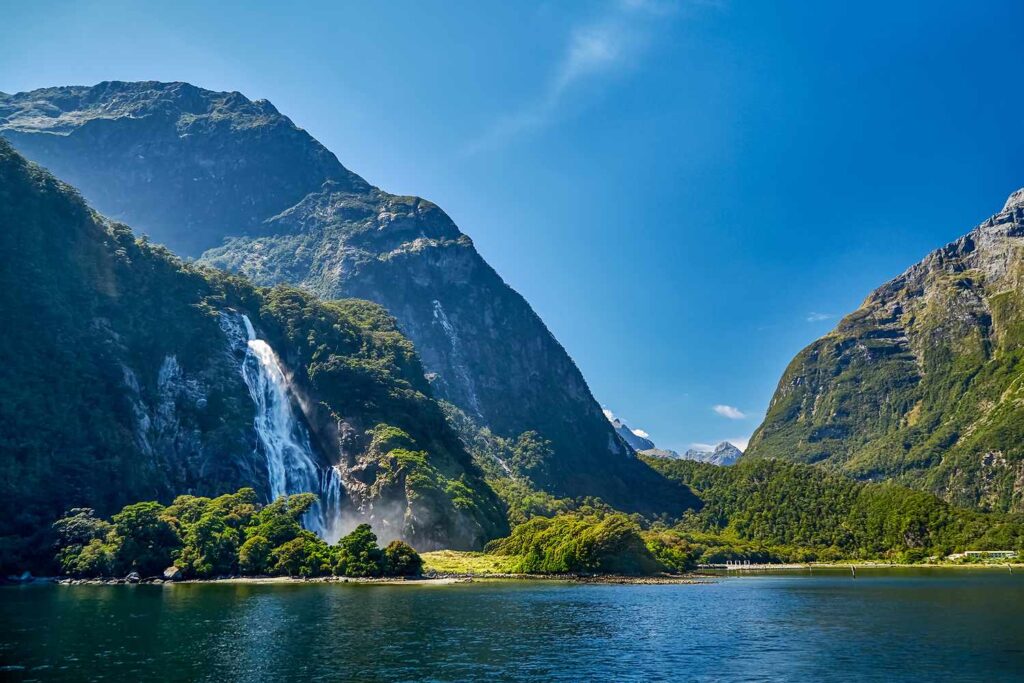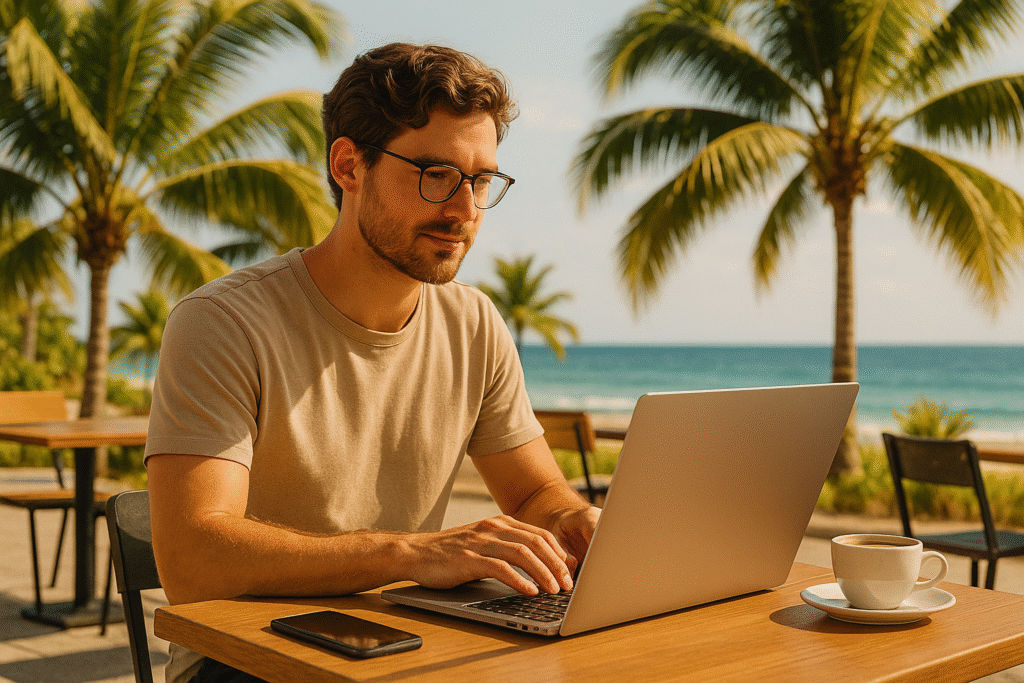Introduction
There is something undeniably appealing about the idea of escaping to a remote island. White sand beaches, crystal-clear waters, and a lifestyle free from the noise of big cities. For many location-independent entrepreneurs, the thought of running a business while living on an island is the ultimate dream. After all, if you can work from a laptop, why not do it from paradise?
But the dream and the reality often diverge. While islands promise peace and natural beauty, they also pose challenges—limited infrastructure, high costs, weak connectivity, and unpredictable logistics. For entrepreneurs, the real question becomes: is it practical to run a serious business from a remote island, or do global hubs like Dubai and Singapore offer a better path?
In this article, we explore the practical side of relocating to islands, the tax and business strategy opportunities they present, and finally compare them with Dubai and Singapore—the two global heavyweights for entrepreneurs seeking growth, low tax exposure, and international credibility.
The Appeal of Remote Islands
The fascination with islands is as old as exploration itself. Remote locations hold a sense of mystery, cultural uniqueness, and natural beauty that is difficult to replicate elsewhere. For digital nomads and location-independent entrepreneurs, islands offer:
- Escape from urban chaos – slower pace of life, fewer distractions.
- Pristine environment – clean air, less pollution, and natural surroundings.
- Cultural isolation – traditions preserved over centuries, offering a different worldview.
- Adventure lifestyle – diving, hiking, and sailing opportunities.
From the Azores in the Atlantic to French Polynesia in the Pacific, remote islands promise a lifestyle very different from London, Dubai, or Singapore. Yet the attraction also comes with hurdles.

Challenge 1: Getting There
Accessibility is often the first obstacle. Unlike major cities, many islands have limited or seasonal flights. For example:
- Flying to Oahu in Hawaii is easy, with multiple daily flights.
- Flying to the Gambier Islands in French Polynesia may require booking months ahead, as only one weekly flight is available.
Fewer flights also mean higher costs. A short island hop may cost more than a transatlantic ticket. For entrepreneurs who need regular travel for client meetings, banking, or conferences, this is a significant drawback.
Moreover, many islands are served by only one airline. Loyalty programs, air miles, or flexible connections are often not options. In extreme cases, some islands cannot be reached by air at all—Tristan da Cunha or Pitcairn, for instance—making them unsuitable for long-term business residency.
Challenge 2: Housing and Cost of Living
Accommodation is another challenge. Most islands focus on tourism, so the housing market is skewed toward short-term luxury stays. Long-term rentals are either scarce or priced at a premium:
- Resorts and hotel chains dominate the market, with rates of $20,000–$30,000 per month.
- Airbnb options can range from $5,000–$10,000 monthly on popular islands.
- Guesthouses may be cheaper but rarely offer suitable conditions for entrepreneurs needing reliable workspace.
Renting locally is possible but usually requires long contracts—six months to a year. For nomadic entrepreneurs who value flexibility, this becomes restrictive. Exceptions exist in places like the Azores or Madeira, where European integration has kept prices reasonable.

Challenge 3: Food and Daily Living
Living on an island often means limited food options. Supply chains are thin, imports dominate, and restaurants operate on restricted hours. On smaller islands:
- Grocery shops may not exist or may open only a few hours per day.
- Dining out can be prohibitively expensive, with average meals costing €50–100 per person.
- Cooking at home is often the only sustainable solution, but even basic ingredients may cost several times more than in mainland cities.
This raises the cost of living considerably, especially for entrepreneurs accustomed to big city conveniences.
Challenge 4: Connectivity and Work Productivity
For remote entrepreneurs, internet access is the lifeline of business. Yet on many islands:
- Internet is delivered via satellite, often unreliable in bad weather.
- Coworking spaces are rare, and coffee shops with Wi-Fi are almost non-existent.
- Buildings are often designed for outdoor living, making air-conditioned work environments hard to find.
Working productively in 35-degree heat without proper infrastructure is a major barrier. Unlike Dubai or Singapore, which have world-class coworking hubs, an island entrepreneur is often left working from a small rented villa with shaky Wi-Fi.
The Tax & Business Strategy Angle
Now we move to the real reason many entrepreneurs dream about islands: tax optimization.
Remote islands have historically been linked to tax havens. From the Cayman Islands to the Cook Islands, their appeal lies in:
- No personal income tax in many jurisdictions.
- Favorable corporate structures for offshore companies.
- Asset protection laws that shield wealth from creditors.
However, reality is more complex. Many islands now face international scrutiny. Under OECD pressure, “blacklisted” jurisdictions are restricted by banks and payment providers. Opening or maintaining offshore bank accounts in these places is increasingly difficult.
Even when residency is possible, compliance with FATCA (for U.S. citizens) and CRS (for most others) means that offshore secrecy is largely gone. Entrepreneurs may find themselves with a tax-free residency but no access to global banking.
The Risk Factor
Remote islands often lack double taxation treaties. This makes cross-border business complex and can trigger higher withholding taxes when receiving income from other countries. For entrepreneurs whose clients are global, this can be a dealbreaker.
Islands That Work for Entrepreneurs
Despite the challenges, some islands still offer viable options for entrepreneurs, particularly when combined with solid tax strategies:
- The Azores (Portugal) – EU jurisdiction, relatively low cost of living, access to Europe.
- Madeira (Portugal’s NHR regime) – 10-year low-tax scheme for new residents, full EU compliance.
- Channel Islands (Guernsey/Jersey) – respected financial services sector, strong global banking.
- Cook Islands – famous for offshore trusts, but limited business infrastructure.
- French Polynesia – no income tax, though high living costs and weak connectivity remain issues.

Remote Islands vs. Global Business Hubs
While islands attract for lifestyle reasons, global entrepreneurs inevitably compare them with Dubai and Singapore, the two leading hubs for tax efficiency and business infrastructure.
Dubai
- Taxation: 0% personal income tax, 9% corporate tax (with exemptions in free zones).
- Company Setup: Quick, efficient, with 100% foreign ownership in free zones.
- Banking: Strong global access, including multicurrency accounts.
- Connectivity: One of the busiest airports in the world, global trade hub.
- Community: Massive expat network, thriving entrepreneurial ecosystem.
Dubai offers both lifestyle perks (luxury, safety, global events) and strategic tax advantages. For entrepreneurs running online businesses, it strikes a near-perfect balance between zero tax and strong infrastructure.
Singapore
- Taxation: 17% corporate tax but reduced effectively through exemptions and rebates.
- Reputation: One of the most respected financial hubs in the world.
- Infrastructure: World-class legal system, transparent regulations, stable banking.
- Connectivity: Global aviation hub, excellent trade access.
- Treaty Network: Extensive double taxation treaties, ideal for multinationals.
While not tax-free, Singapore offers unmatched credibility. For entrepreneurs who value reputation and want to build internationally recognized businesses, it is hard to beat.
Remote Islands
- Taxation: Often 0%, but risky and less recognized.
- Banking: Limited and often restricted by global institutions.
- Connectivity: Few flights, weak internet, poor logistics.
- Community: Small, isolated, and not business-focused.
The comparison shows why, despite their appeal, remote islands rarely replace Dubai or Singapore as serious business bases.
Case Study: Tax Planning Scenarios
- Online Consultant
- On an island: zero tax but weak internet and limited credibility.
- In Dubai: tax-free income with global access to clients.
- In Singapore: slightly higher tax but enhanced reputation with corporate clients.
- E-Commerce Business Owner
- On an island: challenges with shipping and customs.
- In Dubai: strong logistics, tax-free profits, central location.
- In Singapore: global distribution hub, efficient customs.
- Investor/Wealth Protector
- On an island: strong asset protection laws (Cook Islands trusts).
- In Dubai: real estate investment options, strong banking.
- In Singapore: safe haven for wealth with full compliance.
Practical Considerations Before Relocating
Entrepreneurs need to consider more than just tax rates. Before moving to an island or a hub like Dubai/Singapore:
- Residency Permits – visa and residency rules vary significantly.
- Banking Access – critical for business survival.
- Compliance – international reporting obligations apply everywhere.
- Long-Term Sustainability – lifestyle vs. growth potential.

Conclusion
Living on a remote island is possible, and for those seeking simplicity and a slower lifestyle, it can be fulfilling. However, for entrepreneurs who rely on global connectivity, robust banking, and strong business ecosystems, the islands remain more of a retreat than a base.
In contrast, Dubai and Singapore emerge as the real winners. Dubai offers unmatched tax freedom and fast-growing opportunities, while Singapore provides world-class infrastructure and credibility.
A hybrid model may be ideal: enjoy the lifestyle of islands when desired, but keep your company headquarters in a global hub. This way, entrepreneurs can combine freedom with stability, tax efficiency with reputation, and lifestyle with growth.

